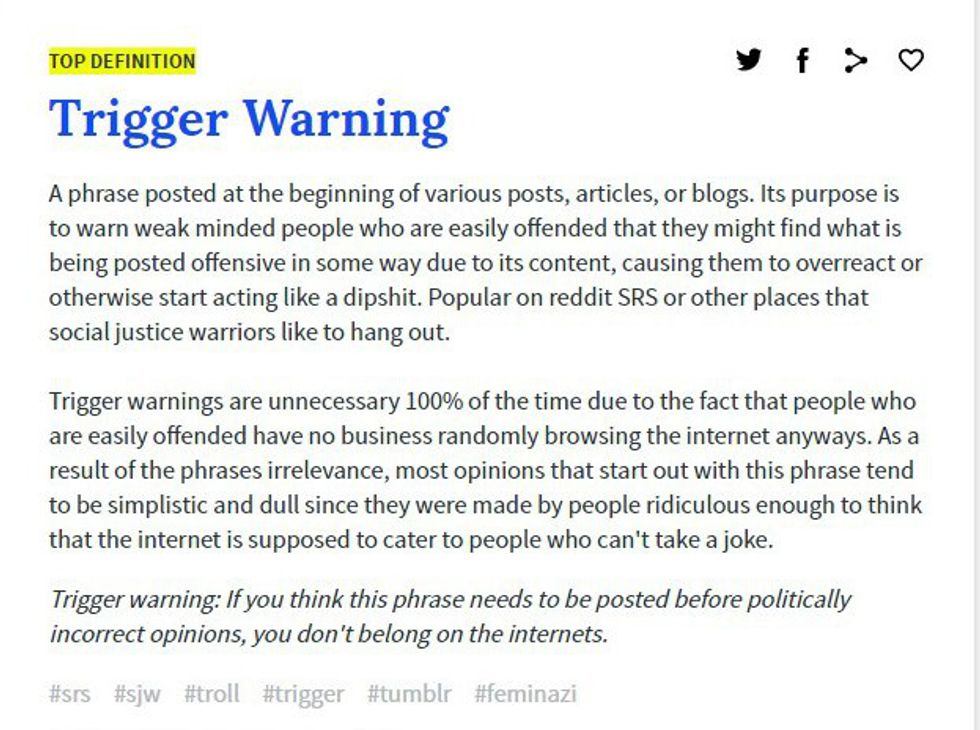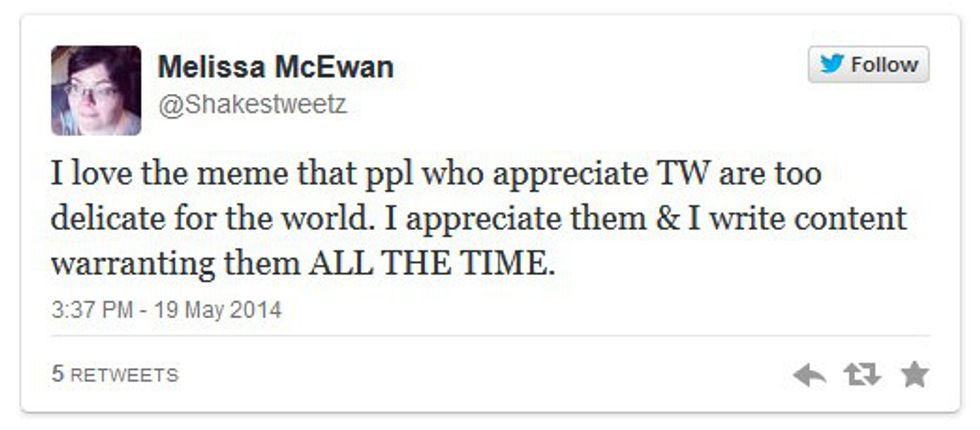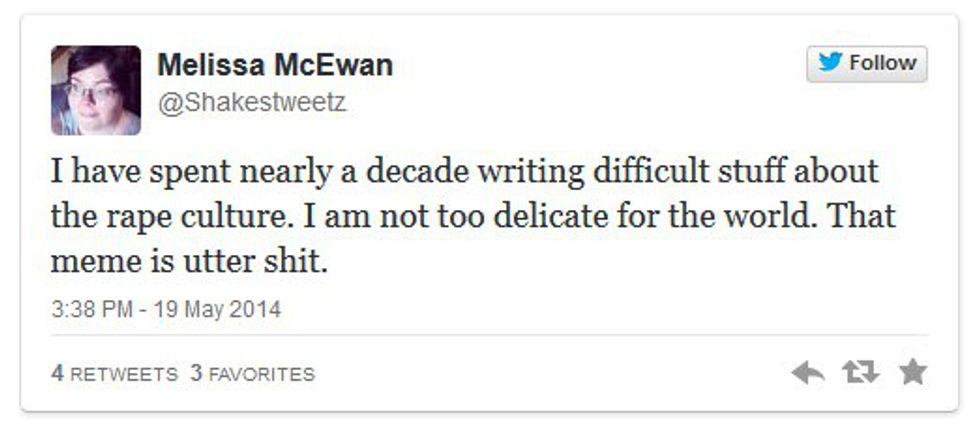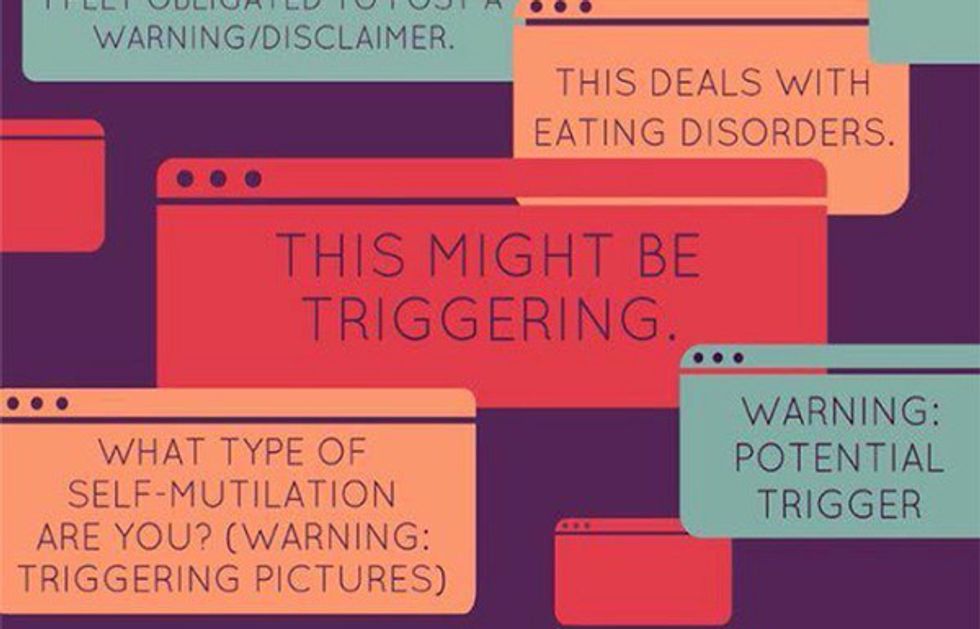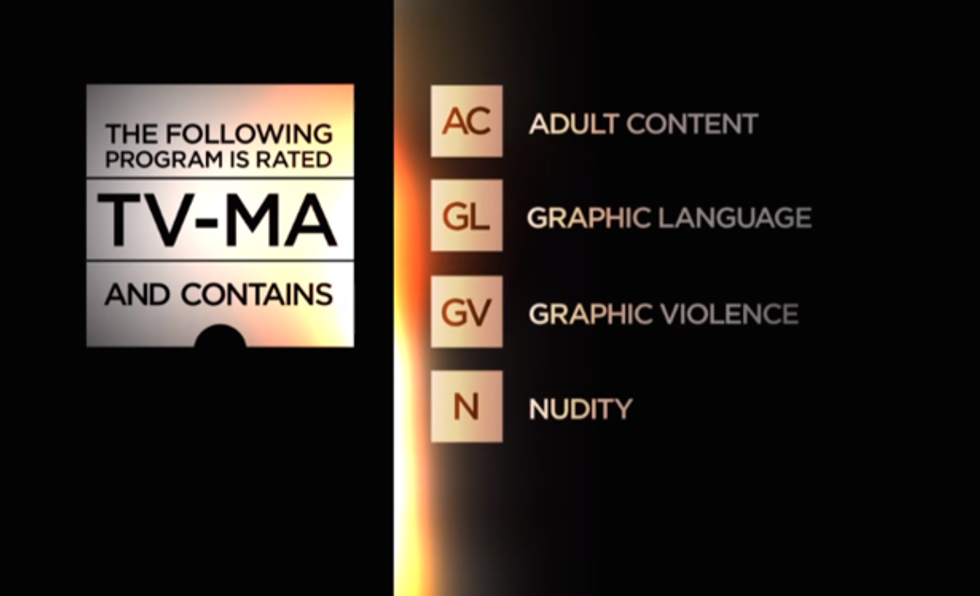This is currently the top definition of trigger warnings in the Urban Dictionary:
Since its coinage, and recent rise in popular vernacular, this is the common connotation that the phrase “trigger warning” has taken to mean. It has even evolved into a popular meme amongst online communities, in which the phrase “triggered” often appears ironically over content which has themes of offensive humor.
In online communities, the original intention of trigger warnings seems to have lost its meaning altogether. Instead it's become synonymous with being “PC”, or “politically correct”, a form of political discourse which is widely criticized as limiting freedom of speech, as it is defined by putting “measures” on such discourse to prevent it from offending or disadvantaging any particular person or group within our society.
But despite the fact that most Redditors would define trigger warnings as an invention of the “feminazis” and “social justice warriors” of the internet, trauma triggers have a very real root in the treatment of post-traumatic stress disorder. Today, when we think of PTSD, we typically think of shell-shocked soldiers returning from wars overseas. When the term “combat fatigue” became coined during Word War II, the discussion of PTSD was still more “moralistic than medical”, with traumatized soldiers typically being blamed for their own suffering. A recognition of PTSD didn’t truly begin until veterans, upset with their government counseling, began forming “rap sessions” with fellow veterans and psychiatrists. “We were trying to understand what we were feeling about the war . . . [the rap session] was a safe place to talk,” a former Marine explained.
Similar to how the concept of PTSD evolved from such sessions set up with veterans at their own insistence with psychiatrists in the 70s, the concept of “trigger warnings” emerged at the issuance of many belonging to the self-help and feminist online community. Many prescribed feminists determined to keep their forums, discussions, and meeting places - much like the veteran’s rap sessions - a “safe place” for rape survivors; which, unfortunately, is still a term with connotations of the female sex rather than being inclusive to men as well. Sexual violence is only just beginning to be understood as a traumatic incident which can lead to the development of PTSD in rape survivors.
Not long after trigger warnings, listing or tagging the contents of a particular post or other media as containing traumatic content started to become common practice in mental health conscious online communities, two other things began to happen, in excess. One: people started to misuse or overuse the phrase “trigger warning” or “triggering” to extend to everything from “shaming” overzealous commenters, to common everyday insults. Two: people began to not only ignore trigger warnings, but actively mock and fight against them.
It seems obvious to me that one such reaction clearly begot the other. Because the former category of people had started to overuse the use of trigger warnings to involve things which could be better categorized as “offensive” than “traumatic”, people began to feel that what was happening was censoring, rather than cautionary. This was abetted by the rise of online commenters who started to insist that “triggering” content be removed entirely, instead of simply noted as such. There is also a valid misgiving amongst trigger warning opposers that such warnings are not “science”, and may, in fact, hinder the recovery of a PTSD sufferer.
While these misgivings may be valid, the recent popularity of the “triggered” meme is most certainly not. Even if it could be proven that the use of trigger warnings is no more than crack science, it seems clear that the evolution of trigger warnings as a joke is only continuing to perpetuate the stigma against mental health. The linkage that the phrase has garnered with the theme of “political correctness” has only validated the efforts of those who still mistakenly believe that suffers of PTSD, or any mental illness, are still entirely to be blamed for their own “suffering”. The perpetrators of this meme are just as harmful to the mental health stigma as the misusers of trigger warnings they are reacting against.
Should we continue to use trigger warnings? It’s hard to say, and their effectiveness is up for debate, but I think that the use of trigger warnings in a commonplace and unobtrusive way could still be a useful adage to the way we consume media today, in the same sense that we use the MPAA film-ratings system to keep our media “child-safe”. But considering the current stigma on mental health, I do not think we are anywhere close to being ready to enact such a system. I consider the recent spike of the “triggered” meme to be a repetition of the same public reaction we saw in the 70s, when traumatized Vietnam veterans were actively dismissed as being weak-minded or even infantile. Considering it's 2016, and people still seem more concerned about shutting down attention-seekers than aiding the mentally ill, I would guess we have another 40 plus years until we are ready as a society to have an open-minded discussion about the future of media in a world that recognizes mental illnesses and trauma as a reality.




